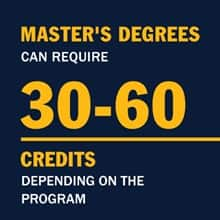What Are the 4 Types of College Degrees?

Know before you read
At SNHU, we want to make sure you have the information you need to make decisions about your education and your future—no matter where you choose to go to school. That's why our informational articles may reference careers for which we do not offer academic programs, along with salary data for those careers. Cited projections do not guarantee actual salary or job growth.
Going to college to earn your degree can help you develop new skills and unlock new job opportunities and salary potential.* But what's the best degree for you?
Whether you're looking to return to school, change careers or pursue a promotion, it's important to consider how the different degrees can help you reach your goals. Understanding how to advance through the levels, how long each program can take and the types of degrees available can be a great starting point.
What Are the Degree Levels in Order?
Explore the list of degrees from lowest to highest. Discover the benefits of each type of degree and learn about how the various levels can help you achieve your goals.
 Types of Associate Degrees
Types of Associate Degrees
If you’re just starting out with higher education or want to add education credentials to your real-world experience, an associate degree could be a great fit.
 "Associate degrees are known as a 2-year degree and are the first degree you can obtain beyond completing a high school diploma, or equivalent," said Dylan Talbot '23, an admission counselor at Southern New Hampshire University (SNHU).
"Associate degrees are known as a 2-year degree and are the first degree you can obtain beyond completing a high school diploma, or equivalent," said Dylan Talbot '23, an admission counselor at Southern New Hampshire University (SNHU).
Talbot, who earned his associate degree in business administration from SNHU, said that associate degrees are typically 60 credits long and they introduce you to general education courses, electives and topics in your area of study.
Some types of associate degrees you can consider include:
- Associate in accounting
- Associate in criminal justice
- Associate in digital photography
- Associate in information technology
- Associate in liberal arts
- Associate in marketing
 There are two main types of associate degrees: Associate of Science (AS) and Associate of Arts (AA). An AS degree can prepare you for jobs available across many industries, including marketing, information technology and accounting. Earning an AA degree can help you develop soft skills employers seek, such as problem-solving, critical thinking and communication.
There are two main types of associate degrees: Associate of Science (AS) and Associate of Arts (AA). An AS degree can prepare you for jobs available across many industries, including marketing, information technology and accounting. Earning an AA degree can help you develop soft skills employers seek, such as problem-solving, critical thinking and communication.
There are great benefits and opportunities that come with starting with an associate degree. For example, earning an associate degree can have a significant economic impact. According to the U.S. Bureau of Labor Statistics (BLS), associate degree holders earned nearly 18% more than workers with only a high school diploma in 2023.*
If you’re unsure about starting a bachelor’s degree program, earning an associate degree is a great way to kickstart your education and enter the workforce before enrolling in a more advanced degree. If you decide to continue to a bachelor’s program, your associate degree credits are typically transferred into the program, allowing you to complete a bachelor's degree faster.
 Mahogany Tillman '22, for example, earned her associate degree in 2020 and transferred credits into a bachelor's program at SNHU.
Mahogany Tillman '22, for example, earned her associate degree in 2020 and transferred credits into a bachelor's program at SNHU.
In the months leading into the pandemic, Tillman had lost one of her greatest supporters, her grandmother. And at graduation, Tillman wore a stole honoring her.
"I made a promise to my family that I was going to complete school," she said. "That's why I went on to continue (to a bachelor's)."
She walked at SNHU's Fall 2022 Commencement nearly two years later, earning her Bachelor of Science in Nursing (BSN).
Read more: Is an Associate Degree Worth It?
Find Your Program
 Types of Bachelor's Degrees
Types of Bachelor's Degrees
Bachelor’s degree programs provide in-depth knowledge and skills across a wide variety of potential career paths to help you stand out in today’s competitive job market.
"A bachelor's degree is a 4-year undergraduate degree and is the second level degree that can be obtained," Talbot said. "You do not need an associate degree to qualify to start a bachelor's degree."
Although, bachelor's program lengths vary based on your pacing, depending on how many classes you take at a time and whether you take any terms off.
 Samiyah Muhammed '23 is a first-generation college graduate who earned her Bachelor of Science (BS) in Criminal Justice with a concentration in Human Services and Advocacy. She hopes to use her degree to help those in need.
Samiyah Muhammed '23 is a first-generation college graduate who earned her Bachelor of Science (BS) in Criminal Justice with a concentration in Human Services and Advocacy. She hopes to use her degree to help those in need.
"I plan to advocate for the little guy," she said. "Hopefully, no one will have to go through the obstacles that I've gone through, and if there's anything I can do to help, I am glad to do so."
Muhammed said she also wants to start life coaching for those who may need a little extra motivation and guidance. And her degree could help her do just that.
 "Bachelor's degrees provide graduates with a firm understand of concepts related to the field of study," Talbot said. He also noted that bachelor's degrees are one of the most common. For instance, according to a 2023 U.S. Census Bureau report, more than 37% of adults over 25 held at least a bachelor’s degree.
"Bachelor's degrees provide graduates with a firm understand of concepts related to the field of study," Talbot said. He also noted that bachelor's degrees are one of the most common. For instance, according to a 2023 U.S. Census Bureau report, more than 37% of adults over 25 held at least a bachelor’s degree.
In today’s competitive hiring climate, it can pay to advance from an associate to a bachelor’s.* According to BLS, bachelor’s degree holders earned about 41% more in 2023 than workers with an associate degree.*
Bachelor’s degrees like a Bachelor of Science (BS) and Bachelor of Arts (BA) offer more opportunities to focus your learning on a specialized area of study. With a business administration bachelor’s degree, for example, you can concentrate your studies on anything from finance, accounting and healthcare management to marketing, entrepreneurship and public administration.
Earning a bachelor’s degree also opens the door to advancing your education with a graduate-level degree.
Read more: Is a Bachelor's Degree Worth It?
 Types of Master’s Degrees
Types of Master’s Degrees
Earning a master’s degree can be a great way to position yourself for growth in your desired field. And everyone's path to a master's degree looks different.
 Evan Fronheiser '21 '23MBA had initially gone to college right out of high school but quickly learned that the traditional college experience wasn't for him. So, he served in the U.S. Air Force for eight years, taking several college courses during that time.
Evan Fronheiser '21 '23MBA had initially gone to college right out of high school but quickly learned that the traditional college experience wasn't for him. So, he served in the U.S. Air Force for eight years, taking several college courses during that time.
Following his time in the military, he worked in the offshore oil industry for several years before deciding to return home and finish his bachelor's degree online.
Shortly after, he became a military academic advisor for SNHU. He then began pursuing his master's degree.
At SNHU's 2023 Fall Commencement, all his hard work paid off as he walked across the stage, earning his Master of Business Administration (MBA) in Project Management.
"I think that having my master's degree is going to help move me onto the next phase of hopefully becoming a project manager," he said.
 With growing opportunities for online master’s degree programs, including those that can be completed in less than 2-years, this degree path is becoming increasingly popular for full-time working adults, such as Fronheiser.
With growing opportunities for online master’s degree programs, including those that can be completed in less than 2-years, this degree path is becoming increasingly popular for full-time working adults, such as Fronheiser.
Employers are also increasing their demand for master’s degree holders.* According to BLS data, jobs requiring master’s degrees are projected to grow by 12.1% through 2033, the largest growth of all the degree types.*
Earning a master’s degree may open the door to advancement within your company, help you tackle new career goals and possibly even boost your long-term earning potential.* For example, master’s degree holders’ median weekly earnings were about 16% higher than bachelor’s degree holders and 64% higher than associate degree holders in 2023, according to BLS.*
Master’s degrees, like Master of Science (MS) or Master of Arts (MA), are available across a wide variety of subjects. Master of Business Administration (MBA) programs are among the most well-known master’s degree programs, with opportunities to study finance, accounting, international business, criminal justice, information technology management and more. A master's demonstrates expertise in a subject area, Talbot said.
If you’re looking to advance your education even further, you may be wondering what comes after a master’s degree?
Read more: Is a Master's Degree Worth It?
 Types of Doctoral Degrees
Types of Doctoral Degrees
If you’re looking to advance your education to the highest degree in college, a doctoral degree may be right for you.
Depending on your industry and career goals, there are several types of doctoral degrees to consider. A few include:
- Doctor of Business Administration (DBA): A doctoral degree tailored to business professionals looking to explore, examine and address business issues. DBA programs are not currently available at SNHU.
- Doctor of Education (EdD): A doctoral degree geared toward leaders (and aspiring leaders) in educational organizations and the education system itself.
- Doctor of Philosophy (PhD): An academic doctorate available to a range of fields. A PhD is typically required to become a professor and can help you start a career in research.
 Dr. Jennifer Barry '04 '06G '23EdD has worked in higher education for over 17 years. She aspires to become a college president one day.
Dr. Jennifer Barry '04 '06G '23EdD has worked in higher education for over 17 years. She aspires to become a college president one day.
"I can see how much the president of a university can impact the trajectory of a school over time, and I'd like to be part of that for an institution," she said.
So, she decided to earn her EdD in Educational Leadership from SNHU. As she walked across the stage at SNHU's 2023 Spring Commencement, she hoped anyone earning their degree would see her and be inspired to pursue their doctorate.
Doctoral degrees can take up to 7-years of intense study to complete. And, according to Talbot, after completing doctoral degree coursework, you could potentially need to sit for comprehensive subject matter exams. A dissertation based on your research interests may also be required and reviewed by a committee of graduate school faculty.
Read more: Is a Doctorate Degree Worth It?

Determining Your Educational Path
 While it's true that it's possible to achieve a high-paying job without a degree, it's worth noting that a college degree can enhance your long-term career prospects.* The multitude of degree options available can be overwhelming, but with careful consideration, you can identify the educational path that best suits your needs and ambitions.
While it's true that it's possible to achieve a high-paying job without a degree, it's worth noting that a college degree can enhance your long-term career prospects.* The multitude of degree options available can be overwhelming, but with careful consideration, you can identify the educational path that best suits your needs and ambitions.
"If you are thinking about pursuing a degree, the first step is determining which degree option is best suited to your needs," Talbot said. He recommended calling the admissions department at the colleges you're most interesting attending.
"They will ask some questions to better understand your goals and what fields you are interested in and can assist in narrowing down your search," he said.
Each career also has its own unique job requirements, and there are often benefits to remaining in the workforce, building your resume and working toward a college degree simultaneously. Companies may even offer tuition assistance programs that can help you pay for college.
If you research and reflect on your long-term goals, you’ll be on the path toward finding what type of degree is right for you.
A degree can change your life. Find the SNHU degree that can help you meet your goals.
*Cited job growth projections may not reflect local and/or short-term economic or job conditions and do not guarantee actual job growth. Actual salaries and/or earning potential may be the result of a combination of factors including, but not limited to: years of experience, industry of employment, geographic location, and worker skill.
Danielle Gagnon is a freelance writer focused on higher education. She started her career working as an education reporter for a daily newspaper in New Hampshire, where she reported on local schools and education policy. Gagnon served as the communications manager for a private school in Boston, MA before later starting her freelance writing career. Today, she continues to share her passion for education as a writer for Southern New Hampshire University. Connect with her on LinkedIn.
Explore more content like this article

What is a Bachelor of Arts Degree?

What is a Growth Mindset?

How to Stop Procrastinating: Why People Do It and How to Overcome It
About Southern New Hampshire University

SNHU is a nonprofit, accredited university with a mission to make high-quality education more accessible and affordable for everyone.
Founded in 1932, and online since 1995, we’ve helped countless students reach their goals with flexible, career-focused programs. Our 300-acre campus in Manchester, NH is home to over 3,000 students, and we serve over 135,000 students online. Visit our about SNHU page to learn more about our mission, accreditations, leadership team, national recognitions and awards.


